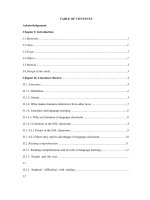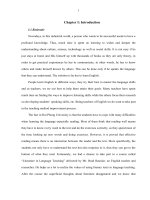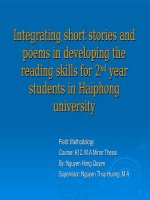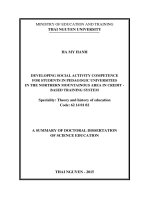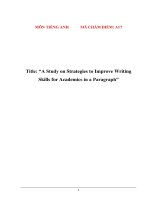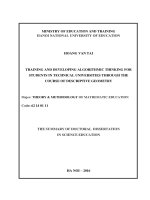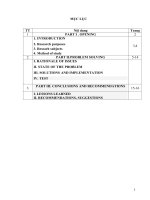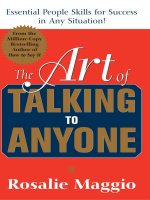Developing self studying skills for students in ethnic preparatory schools
Bạn đang xem bản rút gọn của tài liệu. Xem và tải ngay bản đầy đủ của tài liệu tại đây (444.53 KB, 27 trang )
MINISTRY OF EDUCATION AND TRAINING
THAI NGUYEN UNIVERSITY
LE TRONG TUAN
DEVELOPING SELF - STUDYING SKILLS FOR
STUDENTS IN ETHNIC PREPARATORY SCHOOLS
Speciality: Theory and history of education
Code: 62 14 01 02
A SUMMARY OF DOCTORAL DISSERTATION
OF SCIENCE EDUCATION
THAI NGUYEN - 2016
The dissertation is completed in:
College of Education - Thai Nguyen University
Scientific advisors: Assoc. Prof. Dr Pham Hong Quang, PhD.
Reviewer 1: ...............................................................................
Reviewer 2: ...............................................................................
Reviewer 3: ...............................................................................
The dissertation will be defended before the Dissertation Committee
of the University in College of Education - Thai Nguyen University
At ................, date ...............,month.............. 2016
The dissertation is available at:
National Library
Thai Nguyen University’s Library
Thai Nguyen Univeristy’s Center of Learning Resource
1
INTRODUCTION
1. The need of the research
1.1. The orientation of education reform to meet the
requirements of social development has shown the particular
important role of self - studying in the formation and perfection
characteristics. Self - studying contributes to improve students’
intellectual activity in the acquisition of new knowledge and forming
independent thinking, problem - solving in the learning process;
desire for knowledge, understanding, ambition and dreams; reaching
the pinnacle of science.
1.2. In terms of individuals, developing self - studying skills
help to update, supplement and enrich the knowledge contributing to
the development of society.
1.3. Developing self-studying skills for students is an
important condition and most effective measure to make learning to
become a habit, the need of every person on the way to career
preparation and throughout their lives, is also the leading task in the
schools today. Learning is most effective when students are provided
the opportunity to establish and develop self-studying skills.
1.4. System of Ethnic Preparatory Schools and preparatory
faculties of some schools is the one in association with educational
practice of the mountainous provinces in Vietnam, where the highly qualified ethnic minorities staff for the mountainous, remote and
distant provinces are trained. Self- studying skills of the majority of
ethnic minority students in these schools is very limited, while
students in these schools have great amount of time for self-studying.
Developing self -studying skills for students become an urgent
requirement, a critical task in the current training in the schools,
especially in Ethnic Preparatory Schools.
Because of the above reasons, the author decided to choose
research topics: "Developing self-studying skills for students in
Ethnic Preparatory Schools ".
2. The purposes of the research
On the basis of studying theoretical and practical background
of developing self -studying skills for students in Ethnic Preparatory
Schools, some proposals for developing self - studying skills for
students in Ethnic Preparatory Schools were raised with the aim of
improving training quality of the school.
2
3. Objects, subjects and scope of the research
3.1. Objects of the research
The process of developing self -studying skills for students in
Ethnic Preparatory Schools.
3.2. Subjects of the research
Measures to develop self - studying skills for students in
Ethnic Preparatory Schools.
3.3. Scope of the research
Content scope: The system of self -studying skills is really
diversified, the research studied some necessary skills for students in
Ethnic Preparatory Schools such as: skills of exploring the materials,
group work, problem -solving,...
Time scope: From June, 2012 to June, 2015
Surveying objects: Conducting a survey on the reality in 3
schools: Central Ethnic Preparatory School, Sam Son Ethnic Preparatory
School, Nha Trang Ethnic Preparatory School. The participants consist
of 106 management staff, teachers and 600 students.
Experiment was carried out in Central Ethnic Preparatory
Schools.
4. Research hypothesis
The quality of students’ self -studying and quality of teaching
in the school have dialectal relationship with students’ self -studying
skills. If a system of necessary self -studying skills for students in
Ethnic Preparatory Schools, methods and ways to develop self studying skills in relation to specific characteristics of Ethnic
Preparatory Schools can be identified, some feasible measures to
develop self -studying skills for students will be raised which helps to
improve the training quality of schools.
5. Duties of the research
5.1. Constructing a theoretical basis for the development of
self -studying skills for students in Ethnic Pre -university schools.
5.2. Surveying the reality of developing self -studying skills
for students in Ethnic Preparatory Schools.
5.3. Recommending some measures for the development of
self -studying skills for students in Ethnic Preparatory Schools.
5.4. Carry out an experiment to evaluate the feasibility and
effectiveness of the measures.
3
6. Methodology and Research Methods
6.1. Methodology
6.1.2. System - structure perspective
Researching on developing self -studying skills for students in
Ethnic Preparatory Schools conducted basing on system -structure
approach allows to acknowledge the research issues in an objective
and comprehensive ways and in dialectical unity with inside and
outside elements of developing self -studying skills.
6.1.2. Practical perspective
Educational practice is the origin of research issue, is the
motivation to enhancing research process and is standards for
assessing research results.
Recommending measures to develop self -studying skills in
consistent with the training program, the training content and the
specific characteristics of the Ethnic Preparatory Schools.
6.2. Research Methods
6.2.1. Group of theoretical research methods
- The research analyzed, synthesized, systematized, and generalized
the theory.
- Using development approach: Developing self -studying
skills through a number of intellectual indicators of students in
Central Ethnic Preparatory Schools.
6.2.2. Group of practical research methods
- Methods of observation:
- Methods of surveying by questionnaire:
- Method of conversation:
- Methods of researching product activities:
- Methodology of asking for expert’s opinion:
- Pedagogical Experimental Methods:
6.2.3. A supplementary method: Using mathematical statistical
methods to process data obtained from the survey collected from the
reality surveying and pedagogical experiment.
7. New contributions of the research
7.1. In terms of theory
- The results of the thesis was to build and systematize the
theoretical background for the development of self -studying skills in
association with the characteristics of Ethnic Preparatory Schools;
clarifying necessary self -studying skills for students in Ethnic
Preparatory Schools; the levels, ways and form of developing self -
4
studying skills; factors affecting the development of self -studying
skills for students in Ethnic Preparatory Schools.
Identifying the system of basic self -studying skills needed for
students in Ethnic Preparatory Schools in self-study activities, the sub
-skills and the requirement that students need to meet.
- Building 3 groups of measures consisting of 7 specific
measures. Each measure describes the objectives, content, proceeding
and conditions to apply measures to guide the implementation of
measures into practice.
7.2. In practice
- The research evaluated the reality of students’ self - studying
skills in Ethnic Preparatory Schools and the reality of developing
self- studying skills for students in these schools. The author also
specified the causes and factors affecting the reality of research
problem as a basis for proposing practical measures.
- Designing and organizing experiment using the
recommended measures. The experimental results have confirmed
the effectiveness and feasibility of the measures.
- The results of the thesis are useful references for teachers,
managers and students in Ethnic Preparatory Schools.
8. Some points need defending
8.1. Self -studying skill, an important learning skill, needs
developing for students in Ethnic Preparatory Schools.
8.2. To develop self -studying skills for students in Ethnic Pre university schools, there is a need to identify the content, way and
measures associated with the school's characteristics and the
characteristics of ethnic minority students.
8.3. The findings and application measures of developing self studying skills for students in Ethnic Preparatory Schools is proposed
in the thesis will contribute to innovate the content and teaching
methods in Ethnic Preparatory Schools, orienting and changing
training process into self-training process, help to improve learning
outcomes and teaching quality of schools.
9. The structure of the thesis
Besides the Introduction, Conclusion and Recommendations,
the thesis consists of 4 chapters:
Chapter 1. Literature review on the development of self studying skills for students in Ethnic Preparatory Schools.
5
Chapter 2. Reality of developing self -studying skills for
students in Ethnic Preparatory Schools.
Chapter 3. Suggested measures to develop self -studying skills
for students in Ethnic Preparatory Schools.
Chapter 4. Pedagogical Experiment
Chapter 1
LITERATURE REVIEW ON THE DEVELOPMENT
OF SELF - STUDYING SKILLS FOR STUDENTS IN ETHNIC
PREPARATORYSCHOOLS
1. Literature review
Studies on development of self- studying skills takes place in
two directions: The first strategy: developing self- studying skills in
association to the study of self-study. The second strategy:
Development of self- studying skills is attached to the development
of learning skills.
Literature review on the researches of the same issues in the
world and in Vietnam revealed that most authors studied self- study
in a fairly comprehensive way, such as: The role of self-study, self studying skills, measures to organize training activities with the aim
of improving the efficiency of learners’ self -studying. Self -studying
is studied from different extent by interest authors, mainly in the
following several aspects: Self -studying skill is seen as inside
conditions, important to improve learning outcomes; clarify and
describe them; constructing processes and identifying measures to
form self -studying skills, from which apply to train specific skills.
The development of self -studying skills considered in relation to the
teaching process is organized under the control of teacher system
through cognitive exercises to perform academic tasks.
Although many authors studied the formation and perfection of
self -studying skills or capacity development with many different
approaches, different concerns, but it can be said that:
- Most of the researches are still heavily theoretical. They
mainly studied and analyzed at the macro level, the theoretical model
without going into detail, not really, and have almost no attachment
to the practice in schools in Vietnam, especially the specific teaching
environment in Ethnic Preparatory Schools.
6
- There has been no studies yet to mention a full theoretical
basis as well as the specific issue of the self -studying skills of
students in Ethnic Preparatory Schools.
- There has been no thesis conducting a survey or an
experiment of students’ intellectual indicators in Ethnic Preparatory
Schools to take the impact, psychological and behavior adjustment,
and raising corresponding measures for training and developing self studying skills for students of Ethnic Preparatory Schools.
- There have been some researches coming up with some
measures, ways to apply this theory in practice, however, they cannot
be easily transferred or widespread for students in Ethnic Preparatory
Schools who are outside subjects, in addition to common
characteristics of high school ages, they have specific characteristics
of ethnic minority students learning additional knowledge and
preparatory school programs.
1.2. Some basic concepts related to the research
1.2.1. Self - studying
Self-studying is defined as independent activities, individuals
and requires a high sense of self-consciousness, having right attitude,
purposefulness with clear objectives, and a system of self-studying
skills. Self-studying shows the ability of self-control, self-adjustment,
self - designing plans and implementing learning plans, selfassessment of their own learning towards creativity, to strengthen,
expand and develop knowledge, skills and techniques.
1.2.2. Self-studying skills
1.2.2.1. Skills: Skill is the use of knowledge and experience to take
actions or practical activities in specific conditions to help them
achieve the target results. Skills express the level of thinking tasks,
capabilities and technical actions.
1.2.2.2. Self-studying skills: Self - studying skills are the mode of
operation on the basis of selecting and applying of knowledge, skills
and experience to implement the target results of learning suitable to
permissible conditions.
1.2.3. Developing self-studying skills
1.2.3.1. Development: Development is a special case of motion
expressing upward trend of the subjects in objective reality, is a
process of transformation from one state to another state to be more
and more complete.
7
1.2.3.2. Developing self-studying skills: Development self -studying
skills is the process of changing, increasing students’ self - studying
skills from the low to the high level, from incomplete to complete to
make learning becomes effective.
1.3. Theory on self- studying skills and develop self-studying skills
1.3.1. Role of self - studying skills
1.3.1.1. Self -studying contributing to the formation of self -studying
capabilities to help learners study with potentially life-long learning.
1.3.1.2. Self -studying is a bridge between the academic and scientific
research
1.3.1.3. Self -studying deciding study outcomes, the quality and
effectiveness of learning
1.3.2. The system self-studying skills: Depending on the approach to
the issues, researchers divided self -studying into various component
skills. In our opinion, self -studying skills can be divided into the
following groups: Skill of building self-studying plan; material
selection skills; skills of choosing suitable forms of self-studying;
information processing skills; skills to apply knowledge into practice;
skills of exchanging and sharing information; self-assessment skills.
1.3.3. The stages of formation and development of student’s selfstudying skills: The study on the formation and development of self studying skills by some authors such as: K.K. Platonov and G.G.Golubev;
P .Ia Gapenrin; X. I.Kixegof; F. B. Abbatt; Pham Tat Dong; Nguyen Van
Phuong; Tran Quoc Thanh; Bui Xuan Mai; each of the study has different
ways to divide stages. The formation and development of self - studying
skills must undergo from low to high level.
1.3.4. The level of development of student’s self-studying skills
From the stages of skill formation, we determine the respective
level of development of self -studying skills as follows: The high
level (very proficient); credit level (proficient); low level (not
proficient).
1.4. Developing self-studying skills for students in Ethnic
Preparatory Schools
1.4.1. Features of schools and Ethnic Preparatory Schools
1.4.1.1. System of Ethnic Preparatory Schools
The Ethnic Preparatory Schools are responsible for fostering
cultural knowledge according to different block (previously), and
combinations of these tests of universities currently used for students
from ethnic minorities in the mountainous, remote areas who
8
graduate from high school, but don’t have enough points to be
eligible to study at a university.
In terms of recruiting subjects: Students belong to the first
priority group and sector 1 (KV1) defined in current Regulation of
full - time college and university admission.
1.4.1.2. Training objectives of the Ethnic Preparatory Schools
The goal of the school is to complementarily improve
knowledgeable level for ethnic minority students failing the entrance
examination into the university so that they are provided sufficient
amount of knowledge to attend further education. To achieve that
goal, students must actively make intensive efforts, maximizing
internal subjective resources in learning activities. Simultaneously,
they should gradually develop their self -studying skills so that they
are able to acquire sufficient amount of knowledge to be eligible to
continue their education in universities.
1.4.1.3. Psychological characteristics of students in the Ethnic
Preparatory Schools
- In terms of awareness: The most striking characteristics of
these ethnic students’ thinking is a habit of unenduring mental
working, afraid to think, afraid to brainstorm, they often think one
way and are afraid of go detailed into the intrigue or hassle matter,
and easily accept what others say.
- In terms of communication: Their communication ways don’t
often speak softly enough but frankly, sincerely, but due to their poor
expressing ability, they lack confidence in communicating and are
usually afraid of contact, defending their own reviews .
- In terms of other personality traits: They live honestly,
simply and innocently; love labor, easily believe in others. However,
they are often complex and lack of confidence because they consider
themselves as being weak, backward, can’t be good. Especially, their
complex, one of the causes of the lack of effort, lack of attempt in
learning capacity of students, which is perfectly suited to Adversity
Quotient (AQ) of the students.
1.1.4. Features self-studying activities of students in Ethnic
Preparatory Schools
- Self-studying environment in these schools has concentrated
nature, very convenient and effective when supervised and controlled
in certain places. These schools usually have clear and strict rules in
organizing self-studying activities of students, this is considered as
9
specific characteristics activities in the school system because thanks
to favorable boarding environment, the organization of self -studying
activities can be actually effective.
- Ways of self- studying: are often more diverse with wide range
of forms such as: Studying alone, exchanging with groups of friends,
with teachers; under teacher’s individual and general guidance.
- The amount of time for self-studying: accounts for most of
boarding time. The average time for daily self-studying of each
student is from five hours to six hours.
- The level of implementing task: Students in such schools
usually have more workload to complete during the self-studying
hours than that of other high school students.
- The efforts of the students in the study itself is not high.
1.4.2. The content of developing self -studying skills and other
necessary skills for students in Ethnic Preparatory Schools
1.4.2.1. Content of developing self - studying skills
Content of developing self - studying skills for students
includes: Raising awareness of students about the role and
significance of self - studying, knowing different self-studying
methods and effective forms of self-studying, raising awareness
about the importance of practicing self -studying skills, forms and
ways of practicing self -studying skills.
1.4.2.2. Necessary self -studying skills for students in Ethnic
Preparatory Schools
The dissertation identified six important and necessary self studying skills for students in Ethnic Preparatory Schools: Skill of
self -studying plan; skill of exploring learning materials; self studying skill at class; group work skill; problem-solving skill; skill
of self-assessing the results of study. Each skill includes number of
sub -specific skills.
1.4.3. Developing self-studying skills for students in Ethnic Preparatory
Schools according to modern educational approaches
1.4.3.1. Approaching from the perspective of regular and lifelong learning
Approaching self -studying skills from the perspective of
regular and lifelong learning shows that self -studying skill is a very
important skill in life, help them with ability of regular and lifelong
self-studying.
10
1.4.3.2. Approaching from the perspective of tectonic theory
Tectonics theory is an approach "teaching" basing on the study
of the "studying" with the belief that knowledge is constructed by
each individuals so students will become much more solid than
receiving from others.
1.4.4. The ways and form of developing self- studying skills for
students of Ethnic Preparatory Schools
1.4.4.1. Developing self- studying skills for students through teaching
Teaching is a basic path and the most important for the
development of self -studying skills for students.
1.4.4.2. Developing self- studying skills for students through selfstudying hours
Self-studying activities are specific characteristics of Ethnic
Preparatory Schools, they are also favorable conditions for
developing self- studying skills for students.
1.4.4.3. Developing self- studying skills for students through
experiencing activities
This is the most sustainable way to developing selfstudying skills for students.
1.4.4.4. Forms of developing self- studying skills for students.
- Integration, Integrated development of self -studying skills
with formal courses and each lesson.
- Organizing self -studying hours for students; Organizing of
extracurricular classes on self -studying skills.
- Organizing creative experiencing activities in association
with the subject; Organizing Course club; E-learning (learning,
training is based on IT).
1.4.5. Factors affecting the development of self-studying skills for
students in Ethnic Preparatory Schools.
The elements of students.
The elements of teachers.
The elements of teaching environment: Factors affecting the
development of students’ self -studying skills include: program and
educational goals of the school; students; school managers;
guaranteed conditions and facility.
Conclusion of Chapter 1
The researches in the world and in Vietnam on self -studying
skills have shown that most authors studied it in a relatively
comprehensive way like as: The role of self-studying, self - studying
11
skills, measures of learning organization in order to improve the
effectiveness of teaching activities. Self -studying skills are viewed in
relation to the training activities of the teaching process.
Although many authors studied the formation and perfection of
self -studying skills or developing self -studying capacity with many
different approaches, different concerns, but it can be said that:
There has been no studies conducting investigating and survey
intellectual basis of self-studying, conducted experiment to measure
intellectual indicators to have the impact and corresponding measures
to train and develop self - studying skills for students, especially, for
students in Ethnic Preparatory Schools, who are ethnic minorities
acquiring additional cultural knowledge to enter universities
Basing on referencing and inheriting the results of previous
studies and the author determined the content and form of developing
self -studying skills for students in Ethnic Preparatory Schools;
building a system consisting of 6 self -studying skills with 32 sub self
- studying component skills; choosing path of developing self studying skills for students in these schools. The author also
identified the factors affecting the development of self -studying
skills for students in Ethnic Preparatory Schools including elements
related to students, teachers and teaching environment. This will be
an important theoretical basis for us to propose measures for the
development of these skills.
Chapter 2. REALITY OF DEVELOPING SELF - STUDYING
SKILLS FOR STUDENTS IN ETHNIC PREPARATORY CHOOLS
2.1. Some general issues about the reality
The survey aimed to find out the reality self-studying
activities, self -studying skills of students and the reality of teaching
towards the development of self -studying skills of teachers in Ethnic
Preparatory Schools.
The author conducted a survey on the reality in 3 schools:
Central Ethnic Preparatory School, Sam Son Ethnic Preparatory
School, Nha Trang Ethnic Preparatory School. The participants
consist of 106 management staff, teachers and 600 students.
Time Survey: School Year 2013 - 2014
2.2. Survey results
2.2.1. Survey of intellectual capacity of students in Ethnic Preparatory Schools
To carry out the thesis, the author had to coordinate with the
Center of Human race Research and intellectual development of
12
Vietnam National University to conduct survey intellectual capacity
of 449 students in Central Ethnic Preparatory School, the results
obtained are as follows:
- About Intelligence Quotation (IQ): average IQ of students
is100.44 ± 13.743 points, the majority of students only reach average
IQ (average IQ range from 90 to 109). Male students have higher
average IQ than female students. The average IQ of the Tay minority
students is greater than the IQ of students of other ethnic groups.
- About Emotion Quotation (EQ): average EQ is 19.86 ± 3.425
point, the majority of students reach only a little above average EQ
(average EQ is 15 points).
- About Adversity Quotient (AQ): Students’ average AQ is
134.88 ± 19.041 points, the majority of students only achieve below
average AQ (average AQ is 147.5 point).
2.2.2. Current reality of self-studying skills in Ethnic Preparatory Schools
2.2.2.1. The awareness of teachers and students of the role of selfstudying in the learning activities at school.
The majority of students and teachers are aware of the need of
self-studying in the learning process at schools (student 95%; teacher
92.5%). The role of self-studying activities: 78.8% students thought
self-studying activities help them be able to assess themselves; 62.3%
of them noticed that self -studying activities will help them to work
steadily in the future.
2.2.2.2. Purposes, time and method of self-studying of students in
Ethnic Preparatory Schools
a) Students’ purposes of self-studying: The purpose of self studying of the majority of students (> 80% agree and totally agree)
is derived from short-term benefits while studying at the schools.
b) Students' self-studying time: The majority of students (92.5%)
spent from 3 to 5 hours a day to study, during their exam time, they
usually spent more than 5 hours a day for self-study (95 %).
c) The reality of self- studying methods of students: students
often use familiar learning strategies since he was ordinary students
(use full notebook, flipped theoretical view and homework).
2.2.3. The reality of developing self - studying skills for students in
Ethnic Preparatory Schools
2.2.3.1. The reality of teacher’s level of developing self -studying
skills for students: Teachers in the teaching process was initially
equipped and trained necessary self - studying skills for students. But
13
the level of practice was still limited, only focused primarily on some
of self -studying skills such as: self - studying skills in classroom;
problem -solving skills in academic matters.
2.2.3.2. The reality of level of using teaching methods for students to
develop self -studying skills for students: In the daily teaching
activities, some positive teaching methods were used more regularly
(> 50%) in their teaching activities that promote positiveness, thereby
developing students' self -studying skills for students .
2.2.3.3. The reality of the extent of using the forms to develop self studying skills for students: teachers in these schools applied regularly a
number of forms to develop self - studying skills for students such as:
Designing teaching content in integration with the development of self studying skills; organizing teamwork, discussing research problems
themselves; organizing the clubs according to subject, school sections,
organizing extracurricular activities.
2.2.3.4. Current reality of students’ self - studying skills
We focus on evaluating the following self -studying skills: Skills of
planning of self-studying; Skills of exploring learning materials; Skills of
self -studying in classroom; Skills of group working; Problem - solving
skills in learning; Skills of self-examination, self- evaluation results
Through analysis of individual attainment of each self -studying
skill, synthetizing all achieved level of self -studying skills shows that:
Self -studying skills of students in these schools are limited. In which,
there are some component skills: teamwork skills, problem - solving
skills, planning skills is at inadequate level. (<2.00).
Exploration and evaluation of students’ level of achievement
of self - studying skills from teacher’s viewpoint, we have also
obtained similar results with the results of students’ self-assessment.
Evaluation results are shown in Figure 2.1.
Chart 2.1. Students’ self-assessment and teacher’s evaluation about the
level of student achievement of self -studying skills
14
2.2.3.5. The difficulties of the teachers and students when developing
self - studying skills for students
The development of self-studying skills in Ethnic Preparatory
Schools faces a lot of difficult towards the objective and the subjective.
Among of them, there are some major difficulties such as teacher’s
lack of knowledge about teaching self -studying skills (82%); teachers
have little opportunity to exchange experiences about the teaching of
self -studying skills for students (80.2%); The curriculum has not
created favorable conditions for the development of self -studying
(76.4%); Students’ cognitive abilities is slow (74.5%),...
2.2.4. Status of factors affecting the development of self-studying
skills in Ethnic Preparatory Schools
Through a survey of 106 teachers, and management staff on 3
main groups of factors: the elements related to students, the elements
related to teachers and pedagogy environmental elements. The results
showed that the majority of teachers and managers have very high
awareness of the effects of three groups of factors on the
development self -studying skills for students in Ethnic Pre university Schools. Three groups of factors have an important role, in
determining the formation, development and practice of self studying skills for students in Ethnic Pre -university Schools.
Conclusion of Chapter 2
1. The majority of teachers and students were aware of the
importance of self-studying and self -studying skills for self-learning
activities of students. In the daily learning activities teachers have
initially paid attention to training and developing self -studying skills
for students in Ethnic Preparatory Schools through the design of
content, organization of learning activities to promote active learners.
2. Self - studying skills of students in Ethnic Preparatory
Schools is integrated skills including multi -skills, in which the
author surveyed six main essential skills. Basing on the subjects,
curriculum, training objectives and characteristics of self-studying
activity, we believe that the training and developing self -studying
skills for students in Ethnic Preparatory Schools are really
meaningful in their learning time at the schools and in preparing
them necessary skills to study at a university. Through surveying the
reality of development self -studying skills from students,
management staff and teachers, the results showed that: self studying skills of students is at average level, especially, group work
15
skills and problem -solving skills of students are still limited. These
limitations are due to many reasons: teachers and students are used to
old learning and teaching method, teachers lack experiences in
teaching skills, students are limited in thinking abilities
3. The development of self -studying skills for students in
Ethnic Pre -university Schools is affected by both inside conditions
and outside objective factors. There are three main groups of factors:
Factors in relation to students, elements related to teachers,
Management staff and the pedagogy environmental elements, these
factors have a dialectical relationship, mutual interaction creating an
overall interactive teaching environment.
Chapter 3. SUGGESTED MEASURES TO DEVELOP SELF STUDYING SKILLS FOR STUDENTS IN ETHNIC
PREPARATORY SCHOOLS
3.1. Principles of proposing measures
Including the following principles: Ensuring educational and
training objectives of the school; ensuring the promotion of initiative,
creativity active learners; ensuring synchronization system; ensuring
the practicality, feasibility and effectiveness.
3.2. Measures to develop self -studying skills for students in
Ethnic Preparatory Schools
Each measure is built according to the structure: objective and
significance of the measures; content of measures; ways to
implement measures; conditions of implementation measures.
3.2.1. Group of measures to develop self -studying skills through teaching
3.2.1.1. Developing school curriculum in Ethnic Preparatory Schools
towards the development of self -studying skills for student
Program development is a continual process in order to perfect
education programs continuously. In this view, education programs
for students in Ethnic Preparatory Schools defined as an entity which
isn’t designed once and used for forever but is developed,
complemented and completed depending on the change in the level
of socio - economic development, achievement of modern science technology towards the trend of general education and higher
education.
Implementing Resolution 29 of Central Executive Committee
about the fundamental and comprehensive innovation of general
education and higher education has seen a significant change in
rebuilding programs of general education higher education in
16
orientation to capacity. This requires programs of these schools need
changing according to the capacity approach in order to be "perfect
joining" the two programs.
Developing the school curriculum in the schools towards
capacity approaching is to help ethnic minority students achieve the
goal of "Learning to know, learning to do, learning to self-assertion
and learning to live together". After finishing the course, students not
only learn the knowledge, skills and attitudes but also learn how to
solve problems, have team work skills, life skills and other self studying skills.
3.2.1.2. Designing teaching process towards the development of self studying skills for students in Ethnic Preparatory Schools
Teaching is a complete process, the elements constituting the
teaching process is in close relationship with each other. Teaching
aims to develop self -studying skills regularly and lifelong learning
for the students should be organized in a appropriate and logical
sequence: From determining objectives of lessons and subjects to
organizing classroom teaching and evaluating the results of teaching.
Organizing teaching towards the development of self -studying
skills for students helps shape and develop a system of self -studying
skills for students in Ethnic Preparatory Schools. Thereby
contributing to the 4 goals: "Learning to know, learning to do,
learning to self-assertion and learning to live together".
3.2.1.3. Innovation of testing, evaluating the results towards developing
self -studying skills for students in Ethnic Preparatory Schools
The innovative trend today is "evaluating for the advancement
of learners", so assessment is regarded as part of lesson plan and is
integrated into the class plan.
Testing and assessing has functions of validating, regulating
and developing teaching process, so to develop self -studying skills
for students in Ethnic Preparatory Schools, it is necessary to
innovate assessment activities.
The author researched and recommended:
- Forms and methods of assessing students’ self -studying skills.
- Steps to assess student’s learning outcomes towards
developing self -studying skills.
- Building criteria for evaluating teaching hours of teachers
towards evaluating learning activities in integration to develop self studying skills for students.
17
3.2.2. Groups of measures to develop self -studying skills through
organizing self-studying hours
3.2.2.1. Teaching self -studying skills in modules for students in
Ethnic Preparatory Schools (Organizing self -studying modules
toward educating life skills)
Self - studying skills includes some component skills. Each skill
is characterized by system of separate manipulation. So each skill can be
trained separately for students in Ethnic Preparatory Schools.
In terms of students in Ethnic Preparatory Schools, outside
learning classroom subject time, they are also required to self - study
under the organization and supervision of teachers.
We designed the process of teaching necessary self -studying
skills for students in Ethnic Preparatory Schools towards approaching
life skills in order to provide the theoretical and practical basis for
students develop self - studying skills in their life and during learning
time at school.
Teaching self - studying skills should be conducted when the
children started school, be completely strange to the new to the new
learning environment.
3.2.2.2. Organizing learning process with flexible combination of
individual and group form to develop self -studying skills for students
in Ethnic Preparatory Schools
Self-studying activities outside school hours play an important
role and directly impact on the effectiveness of learning. This is afterschool activities in class and prepare for the next lesson. This activity
aims for the following purposes:
- To expand and deepen, systematize and generalize what they
have learned in the classroom, making their understanding is more
complete.
- Training skills, applying their knowledge on the situation
appropriately, including the situation depriving from their own life.
- Preparing for acquiring new knowledge by reading lessons in
the textbooks in advance, conducting the experiment, simple
experiments under the guidance of teachers.
- Self fostering a sense of responsibility, self-discipline,
independence, discipline, organized and planning in the study.
For students in Ethnic Preparatory Schools, self-studying hours
are determined clearly in terms of time and place of learning. In this
18
method, we studied and proposed ways of organizing self-studying
hours in combination of individual and group forms.
3.2.3. Group of measures to develop self -studying skills for students in
Ethnic Preparatory Schools through experiencing activities
3.2.3.1 Organizing Club to develop self -studying skills for students
in Ethnic Preparatory Schools
Course club is a place where scientific activities on a specific
field, such as listening to the report of the experts, dissemination of
knowledge in seminars, workshops on scientific content, etc,… are
organized.
Organizing Course clubs with following aims:
- Promoting students’ strength, aptitude, capacity of a scientific
field, creating a favorable condition for students to develop their
career path in the future.
- Equipping them with necessary knowledge and skills
associated with the scientific content to apply to practical - social life,
contributing to the development and perfection personality.
- To create an environment for students to communicate,
behave, good recreation ...
Thus, the proposed measures are designed to create an
environment for students to experience, exchange, learn and, more
importantly, develop interest in learning, their love for the subject.
By doing that, it would be able to promote students to self -study and
develop self-studying skills.
3.2.3.2. Designing Website to support self-studying activities for
students in Ethnic Preparatory Schools
Designing Website providing guides help students overcome
the distance of time and space in learning. Students can learn
anytime, anywhere, using a variety of tools to connect such as
personal computers, laptops, tablets and smartphones. This improves
the efficiency of self-studying. At the same time, it contributes to
orient students to contact to IT, the Internet in an appropriate way and
create interest in learning. On the other hand, create an environment
for students to experience to form and develop self - studying skills,
contributing to form capacity of lifelong self-study.
3.3. The relationship between measures
On the basis of constructing the process, the dissertation
addressed seven measures through three major ways: Through
teaching, through organizing self-studying hours, through organizing
19
work experience for students. Measures have close and dialectical
relationships with each other. Each measure has its own role to play
but if we want to develop self -studying skills for students
sustainably and effectively, these measures should be coordinated
should these measures synchronously.
Conclusion of Chapter 3
Basing on theoretical and practical studies, we have identified
four principles and proposed 7 measures to develop self -studying
skills for students in Ethnic Preparatory Schools.
In corresponding to the growth path, seven measures to develop
self -studying skills for students in Ethnic Preparatory Schools include
curriculum development, organizing learning, organizing testing and
evaluation towards the development of self -studying for students; Self
-studying training towards approaching modules, organizing self studying hours incorporating flexibly students’ different forms of
learning; organizing course clubs, designing websites to support selfstudying activities. These measures have covered all the activities of
Ethnic Preparatory Schools, in accordance with specific conditions of
these schools. Ensuring students conditions to develop self -studying
skills regularly and continually.
The proposed measures have close relationships with each
other, therefore, to develop self -studying skills for students in Ethnic
Preparatory Schools successfully, all measures must be conducted
synchronously, as a results, the quality of training in schools will be
able to be improved.
Chapter 4. PEDAGOGICAL EXPERIMENT
4.1. Purposes of experiment
Experiment was conducted to evaluate the effectiveness and
feasibility of measures to develop self -studying skills for students in
Ethnic Preparatory Schools. We selected some of the skills to carry
out pedagogical experiments including: groupwork skills, problem solving skills, skills of exploring the learning materials (exploring
documents from study aids Website).
4.2. Results and evaluation
4.2.1. Quantitative results
4.2.1.1. The results of developing self -studying skills of students
a) Group work skills
* Evaluated subjects were students: At the first test, there was
still a significant percentage of students (38.8%) having uncompleted
20
level of group work skills (M3), this ratio tends to decrease in the
second test (25.4%) and continued to fall during third one (11.9%);
while the number of students achieved very proficient teamwork
skills the first test is at average, there was a slight increase in the
second and continued to significantly increase in the third test.
* Evaluated subjects were groups of students we also collected
the same results in the number of students who perceived very
proficient teamwork skills - Good at this skill had shown a significant
increase (from 25.4% to 43.3% and 68.7%), the number of students
with uncompleted teamwork skills decreased significantly (from
34.3% to 19.4% and to 6.0% in the third test). This result allows us to
conclude that pedagogical measures for the development of student’s
group work skills were effective.
b) Problem-solving skills
Statistics show that, in the first test, the rate of students whose
problem - solving skills were at a the first level accounted for quite
high proportion, this ratio also continued to increase slightly in
second test (up 4.5%) and particularly strong the third one (up to
25.4%); the number of students didn’t passed the first skill test was
quite high (40.3%) and decreased in test 2 (17.9%) and test 3 (7.5%).
Thus, measures to train problem - solving skills, although
students keeping pace with this skills were slightly slower than with
the teamwork skills, in the late stage the rate of students achieved this
skills at proficient made up for very high percentage, also the number
of students failing skill reduced considerably.
4.2.1.2. Results of knowledge acquisition of students
Frequency distributing scores in Math and Literature through
three tests
Chart 4.1. Advance Convergence
frequency (f) - number of students got
from Xi scores (%) through 3
Mathematics test
Chart 4.2. Advance Convergence
frequency (f) - the number of students
got form Xi scores (%) through 3
Literature tests
21
We see advance converging lines of experimental group is
always on the right and higher than that of control group and tended to
move to the right after each tests. Meanwhile, the advance convergence
frequency line of the control group is on the left in comparison to that
of experimental group and has little change through the tests. The
frequency of occurrence students with fairly scores (> 7) in
experimental group is often higher than that of control group.
4.2.2. Analysis of qualitative results
4.2.2.1 Student’s spirit, and attitude of learning: After each time of
pedagogic experiment, students’ motivation and their awareness of
learning became better and better, they were more confident and
interested in learning.
4.2.2.2. The development of team work skill and problem - solving
skills of students through training
During pedagogic experiment, at an early stage, teachers
organized teaching modules of teamwork and problem - solving skills
together with the specific illustration and examples, in the later stage,
teachers just mentioned tasks for each group, students identified the
tasks themselves and apply necessary skills solve them. In the final
stage, students assigned the tasks, students actively apply the skills in a
proficient way to organize and run teamwork activities efficiently.
4.2.3. Evaluating skills of exploring materials from self - studying
support Websites
Exploring material skills of student are conducted experiments
to evaluate their ability to explore learning materials in self -studying
support Website for students. Results were evaluated in each
experimental stage. The overall results show that most students
thought that structure of the website were favorable and met the
needs of students from good to very good (> 85%) which is
significant in their access and search documents.
Conclusion of Chapter 4
Analyzing results from the pedagogic experiment showed that:
- In terms of effectiveness of knowledge acquisition: Through 3
tests, Experimental group had significantly higher scores and more
constant increase after each test than those in control group. Although in
the control group, there were some changes, they were quite small,
uneven, and no statistically significant. This proves that self -studying
skills had a positive impact on the perceived knowledge of students.
22
- In terms of developing self -studying skills: Before pedagogic
experiment, teamwork skills and problem -solving skills of most of
students were at average level. After the pedagogical impact using
measures to develop self -studying skills, the number of students
achieved the first level (- very proficient) increased significantly after
each test. This shows the effectiveness of measures to develop self studying skills which had been proposed in the thesis.
- About spirit and learning attitude: In the experimental group,
students seemed to be positive, initiative and independent in thinking
and finding solutions to issues emerging during learning process,
team work seems to be effective by improving the ability to
communicate with the others, being more responsible for the
collective, through which students acquire better knowledge.
CONCLUSIONS AND RECOMMENDATIONS
1. Conclusions
1.1. Self-studying and developing self -studying skills have
been interested by many scientists to clarify many theoretical and
practical issues. These studies all confirmed the role and importance
of self - study, in general, self -studying skills, in particular and
proposed some recommendations to improve the efficiency of selfstudying. Self -studying is associated with the characteristics of
learners, educational environment, therefore, research on developing
self -studying skills for students in Ethnic Pre -university schools is
necessary, contributing to implement the noble mission of Ethnic
Preparatory Schools, contributing to training high quality human
resources for the ethnic minority areas.
1.2. Developing self -studying skills for students in Ethnic
Preparatory Schools is an impact process to change, increase
students’ self -studying skills from a low to a high level, from
incomplete to complete to make learning effective. Based on
psychological characteristics of ethnic students and the training
objectives of the school, we built the content, the way and form of
developing self -studying skills for students in Ethnic Preparatory
Schools; identify factors affecting the development developing self studying skills for students.
1.3. Results from the survey showed that the reality students’
self - studying skills of students in Ethnic Preparatory Schools is low.
The main causes of these limitations include: geographical conditions
23
and living and place students in Ethnic Preparatory Schools is still
very difficult, teacher staff have not focused on developing self studying skills for students. Training programs heavily focused on
content standards but not learners' competency standards. The
program content is heavier in theory, lack of practice and real
experience. The integrated teaching; educational activities, teaching,
training to develop self -studying skills for students is limited. From
these, the author determined that developing self -studying skills for
students needs to be integrated and in the curriculum of the schools,
there should be orientation so that teachers actively develop self studying skills for students in organizing and testing and organizing
extracurricular activities.
1.4. Basing on in-depth analysis and practical background, the
authors have proposed 3 groups of measures (with 7 specific measures)
for developing self -studying skills for students in Ethnic Preparatory
Schools. Pedagogical experiment results have initially confirmed the
feasibility and effectiveness of the proposal. However, this is only the
initial findings which need to be further developed and deployed on a
large scale, this will bring enormous value in the process of training
ethnic minority students in Ethnic Preparatory Schools.
2. Recommendations
2.1. In terms of Ministry of Education and Training
Directing the program modifications, the training content of
Preparatory Schools and Ethnic Pre -university schools towards
capacity.
The Ministry should cooperate with other related Ministries in
promulgating regulations on coordination mechanisms among
Preparatory Schools, Ethnic Preparatory Schools with universities to
build graduation standards, build training programs consistent with
the mission and goals of the schools.
Organizing coaching renewing teaching methods for teachers
of Ethnic Preparatory Schools to improve the quality of teachers to
meet the requirements of fundamental and comprehensive renovation
of education and training in the spirit of 29 Resolution of the Central
Executive Committee in the 11th Part Congress.
2.2. In terms of Ethnic Preparatory Schools
Creating consensus, consistence in awareness among officials,
teachers, employees, students of the school about the importance of
developing self -studying skills for students.
